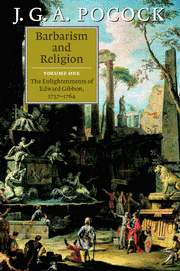Book contents
- Frontmatter
- Contents
- Acknowledgements
- Note on references, quotations and translations
- List of abbreviations
- Introduction
- PART I ENGLAND AND SWITZERLAND, 1737–1763
- 1 Putney, Oxford and the question of English Enlightenment
- 2 Lausanne and the Arminian Enlightenment
- 3 The re-education of young Gibbon: method, unbelief and the turn towards history
- 4 The Hampshire militia and the problems of modernity
- 5 Study in the camp: erudition and the search for a narrative
- PART II THE ENCOUNTER WITH PARIS AND THE DEFENCE OF ERUDITION, 1761–1763
- PART III LAUSANNE AND ROME: THE JOURNEY TOWARDS A SUBJECT, 1763–1764
- Epilogue: Gibbon and the rhythm that was different
- List of references
- Index
2 - Lausanne and the Arminian Enlightenment
Published online by Cambridge University Press: 15 December 2009
- Frontmatter
- Contents
- Acknowledgements
- Note on references, quotations and translations
- List of abbreviations
- Introduction
- PART I ENGLAND AND SWITZERLAND, 1737–1763
- 1 Putney, Oxford and the question of English Enlightenment
- 2 Lausanne and the Arminian Enlightenment
- 3 The re-education of young Gibbon: method, unbelief and the turn towards history
- 4 The Hampshire militia and the problems of modernity
- 5 Study in the camp: erudition and the search for a narrative
- PART II THE ENCOUNTER WITH PARIS AND THE DEFENCE OF ERUDITION, 1761–1763
- PART III LAUSANNE AND ROME: THE JOURNEY TOWARDS A SUBJECT, 1763–1764
- Epilogue: Gibbon and the rhythm that was different
- List of references
- Index
Summary
The disgraced adolescent who arrived in Lausanne in June 1973 was entering on a new historical scene, of great importance to his future writing of history and our understanding of it. The religious tensions inherent in English culture had brought him to Catholic conversion and exile to the Pays de Vaud; those inherent in Swiss Calvinist culture were to restore him to Protestantism but in the end to scepticism, and to intensify his involvement in the clerical erudition that underlay all religious debate, taking him in directions which we can recognise as those of Enlightenment, but of a Protestant Enlightenment active in all the Calvinist or partly Calvinist cultures of western Europe. Of these England, with its Puritan past and the revulsion against it, was or had been one, and Scotland, whose civil and historical philosophy was not yet of the importance to Gibbon it would assume later, was another. In Lausanne, a territory subject to the ruling city of Berne, which had imposed a strictly Calvinist formula upon it a generation before his arrival, Gibbon found himself exposed to all the tensions aflicting a network of Calvinist churches reaching from Geneva to Amsterdam, and these introduced him to new and powerful forms of erudition operating in Christian culture, to a view of theological debate as itself deeply historical, and to an understanding of post-classical European history as driven by that debate.
- Type
- Chapter
- Information
- Barbarism and Religion , pp. 50 - 71Publisher: Cambridge University PressPrint publication year: 1999



